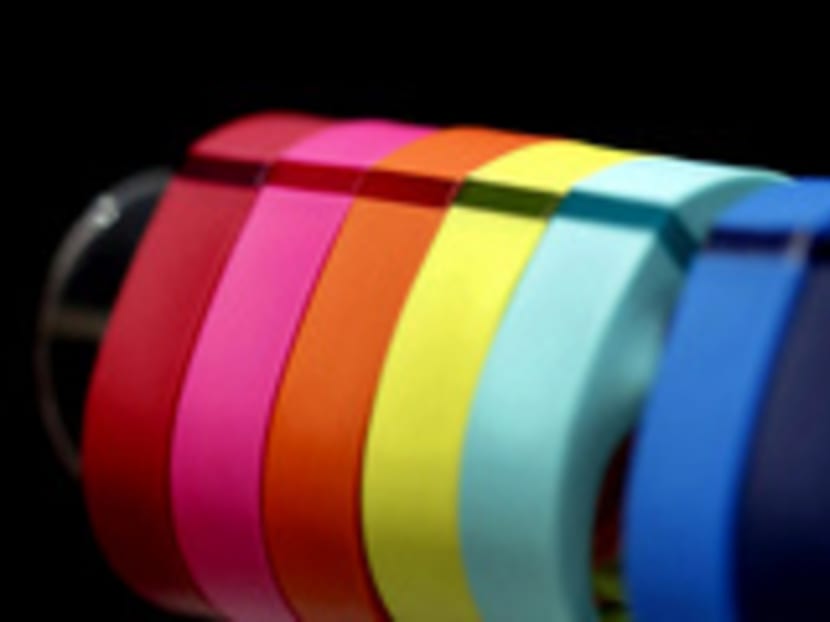Study suggests Fitbit’s heart rates are skipping a beat
LONDON — Fitbit’s heart rate-monitoring wristbands are wildly inaccurate, according to researchers.

Fitbit Flex. Photo: Bloomberg
LONDON — Fitbit’s heart rate-monitoring wristbands are wildly inaccurate, according to researchers.
A study has found that Fitbit devices’ heart-rate readings could be as much as 23 beats per minute (bpm) off, compared to the number recorded by an electrocardiogram (ECG).
“The PurePulse technology embedded in the Fitbit optical sensors does not accurately record heart rate, and is particularly unreliable during moderate to high-intensity exercise,” said the study.
The researchers from California State Polytechnic University studied the company’s heart-rate monitors after a lawsuit, filed in January by individuals who bought the devices to help them track their heart rate, alleged the devices “do not and cannot consistently and accurately record wearers’ heart rates during the intense physical activity for which Fitbit expressly markets them”.
The study was commissioned by the plaintiffs’ lawyers.
“Our claim is that Fitbit knowingly marketed and sold devices equipped with the PurePulse technology that do not in fact accurately measure heart rates during the very types of moderate to intense exercise Fitbit shows people doing in its ads,” Jonathan Selbin, a partner at Lieff Cabraser Heimann & Bernstein in New York City, and one of the attorneys who filed the lawsuit, told British newspaper the Daily Mail.
“It charged more — a price premium — for the ones with the PurePulse than for those without it. For example, the Charge HR typically cost US$20 (S$27.6) more than the regular Charge.
“That’s classic consumer fraud.”
To assess the claims, the researchers tested the Fitbit Surge and Charge HR, two products designed to monitor users’ heart rates, steps walked, calories burned and sleep quality, on 43 healthy patients. They tracked the adults across 65 minutes as they conducted activities that included jogging and running. The results showed the greater the level of activity, the more inaccurate the devices’ readings were.
Not only did the Charge HR and Surge show different heart-rate readings from the ECG, they were also different from one another.
Unlike regular heart-rate monitors, the Fitbit devices have a PurePulse sensor that uses LEDs reflected on to the skin to detect changes in blood volume. Software then calculates the difference to gauge the wearer’s heart rate.
After the lawsuit claimed that Fitbits consistently undershoot actual heart rates, the study found the devices read on average 9 beats per minute (bpm) less than the wearer’s actual heart rate.
During exercise this average jumped to almost 17 bpm inaccuracy, and in one instance the Surge recorded a heart rate that was an average of 23 bpm lower than that recorded by the ECG.
A spokesman for Fitbit described the study as biased and baseless.
“It lacks scientific rigour and is the product of flawed methodology,” said the spokesman. “It was paid for by plaintiffs’ lawyers who are suing Fitbit, and was conducted with a consumer-grade electrocardiogram — not a true clinical device, as implied by the plaintiffs’ lawyers.”
Fitbit spent three years developing the PurePulse technology and conducts “extensive internal studies” that test the accuracy of its products, said the spokesman.
While Fitbit insists the devices are not meant to be scientific or medical-grade, the lawsuit said: “The defect in the PurePulse Trackers presents a safety hazard because Class members could jeopardise their health by relying on the inaccurate heart-rate readings and potentially achieving dangerous heart rates.”
Said Selbin: “Fitbit claims it has done its own testing before and, since bringing the PurePulse devices to market — which of course it paid for — where are those test results?
“We have asked for them but they have refused. And, note that Fitbit never quite says those tests actually support their claim that the devices accurately measure heart rates during exercise. Why don’t they say that? I can guess why.” THE DAILY TELEGRAPH





